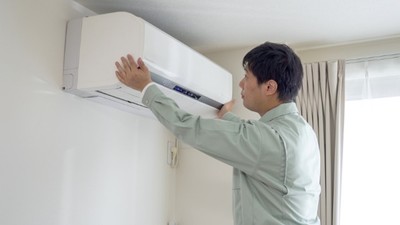8 Steps to Follow Before Running Your Daytona Beach Air Conditioning This Summer

Though Florida enjoys a tropical climate most of the year, it can become especially oppressive during the hot summer months. During this time, air conditioning systems run harder than any other time of the year, which places an unprecedented strain on their functionality and health. Because of this, it is important to follow some very important steps before cranking up the air conditioning in your Daytona Beach home!
Before diving into the health of your Daytona Beach air conditioning, make sure your thermostat is set to off with the temperature turned to a high setting, something around 80 degrees. Now, let’s take a look together at some important indoor and outdoor equipment!
#1. Check your thermostat. Is your thermostat outdated or has it seemingly failed to maintain a comfortable temperature in your home? Consider installing a new one! Programmable thermostats can save you money and energy by maintaining temperatures in more efficient ways.
#2. Take a look at any exposed ductwork. Specifically, keep an eye out for any wear and tear on your system. There may be visible signs of damage that act as a source of cooling loss or energy inefficiency in your home.
#3. Inspect every air vent around your home. Objects that may impede airflow include drapes, furniture, and toys. When air is getting blocked, it may mean that you are not only failing to get proper air conditioning but also harming your system, which necessitates AC repair.
#4. Is the drain line clear? When the drain line of your AC unit is clogged, condensation will build up and cause water damage to your home. It is important to keep that line clear, especially during the hot summer months. Try flushing one cup of vinegar down the line, then rinsing it with a gallon of water for a simple DIY fix!
#5. Change your air filter. If you are unfamiliar with how often your air filter should be changed, check with your AC manufacturer. Some may require a new air filter once a month or every three months. Regardless, you should absolutely kick off summer with a fresh filter.
#6. Check the outdoor condenser unit. Take a thorough look around your condenser unit and make sure there is no overgrowth or debris strangling the equipment, like leaves and vines. These can block interior components and inhibit performance.
#7. Inspect the refrigerant lines. In this step, you want to make sure the refrigerant lines are properly insulated. Proper insulation ensures efficiency of your air conditioning system. If repairs are necessary, rely on professional air conditioning service to fix it up.
#8. Know your unit’s life span. No matter how well an air conditioning system is maintained, it will only last a finite amount of time. Remain cognizant of how much “life” your system has left so that you can be prepared for when it gives out, even after all this maintenance.
By following these basic steps, you can spend an hour of your day ensuring that your air conditioning system is set up to run smoothly all summer long. It is much better to be prepared for system failures than to be caught on a hot day with no air conditioning. If you spot any damages to your AC that require repair, give Extra Air & Heat a call! You will be in experienced hands that care for your air conditioning repair problems as if they were our own. Don’t wait for AC failure, contact us today!
